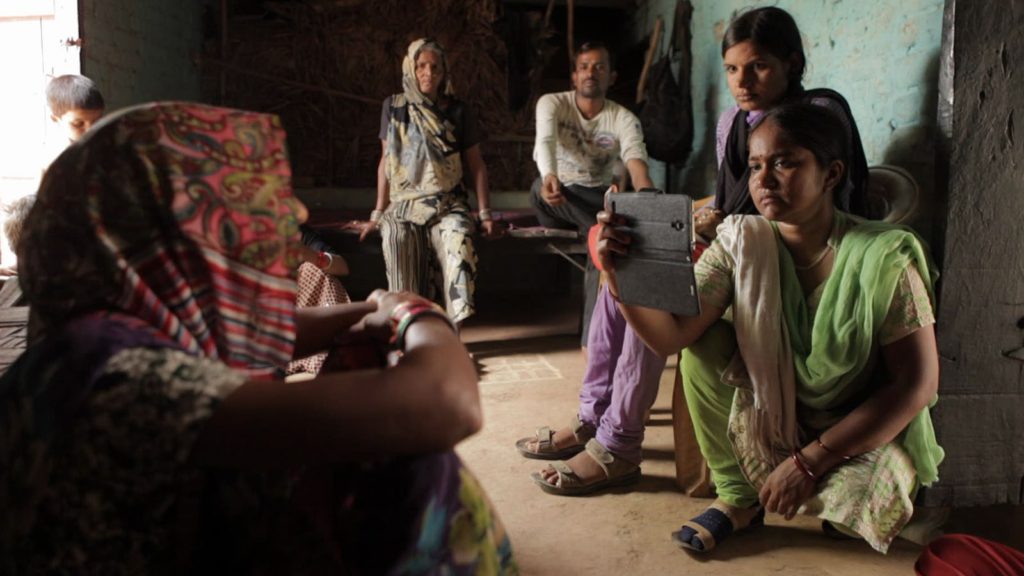The Return: Life After ISIS (2021 | 90 minutes | Alba Sotorra Clua)
Opening in the early days Kurd-run “deprogramming camp” for captured ISIS members in the wake of the Syrian civil war, Alba Sotorra Clua’s documentary immediately plays against our expectations. We meet the film’s subjects, hijab-wearing women attending a seminar in a makeshift classroom tent. One by one, they introduce themselves to each other and the facilitator and it becomes clear that they are all young women from Western democracies, rendered stateless in the wake of a conflict in which some combination of propaganda, disaffection, and a misguided desire to heed a call to join fellow Muslims lured them from their home countries to side with brutal terrorists. In this way, the title is only half-true: it follows their lives after ISIS, but as the days in the camp stretch from weeks, to months, to years, hopes of any sort of return grow slimmer with each passing day. The provocative film juxtaposes the slickly produced recruitment videos against the reality of life among the combatants, with constant bombing, sex slavery, near-constant flight, disease, and starvation as the western alliance encircled the remaining strongholds. Several of the refugees recount harrowing stories of leaving their lives, immediately regretting their decisions, and facing immense suffering and loss for their mistakes. Glimmers of optimism can be found among the friendships formed by these women as they find themselves cast out of their countries and distanced from other hard-liners in the camp. Similarly, audiences may draw inspiration from the capacity of the Kurdish people to set aside vengeance in place of caring for people who tried to kill them in the days before the formation of the camps. But ultimately, in communicating these complex and sobering stories, the thought-provoking documentary poses the unanswered (and perhaps unanswerable) question of what should (or will) become of these people (and their children) in the years to come.

Writing With Fire (2021 | 93 minutes | Rintu Thomas, Sushmit Ghosh)
Whereas the previous documentary is haunted by unanswerable questions, Writing With Fire profiles women in the northern Indian state of Uttar Pradesh whose passion involves confronting challenging problems and doggedly finding answers through the power of journalism. Rintu Thomas and Sushmit Ghosh follow the Khabar Lahariya newspaper, run entirely by Dalit (the caste formerly known as “untouchables”) women, at the precipice of their expansion from a weekly print publication to digital media. At the beginning, we see the team — many of whom have never touched a smartphone for fear of damaging it — anxiously becoming acquainted the tools of online reporting, which makes the skyrocketing YouTube page views all the more impressive as the film tracks their progress over the span of a few years. Along the way, profiles of seasoned reporter Meera, upstart recruit Shyamkali, and newcomer Suneeta illustrate the challenges of their career choices in the face of familial pressures, societal expectations, and entrenched gender bias. We see them on the job, investigating stories around chronically un-prosecuted rape cases, mafia involvement in dangerous mines, sanitary issues in impoverished villages, caste discrimination, as well as consequential state elections and the rise of the BJP party and some of its evangelical followers. Time and again, they bravely confront authorities, refuse to back down in the face of resistance, and their reporting often has a transformational effect on individual lives or the prosperity of their community. Despite bemused husbands or fathers who question their choices to work outside the home, often at punishingly late hours, their strides to grow their publication and successfully wield journalism as a powerful tool for democracy are inspirational. It’s unsurprising that the film claimed Audience and Special Jury documentary prizes at Sundance this spring and I imagine that their powerful story will be a hit among SIFF audiences.
A Q&A with Writing With Fire co-directors Rintu Thomas and Sushmit Ghosh was conducted on April 12 and is now available on the film’s page on the WatchSIFF platform; a live Q&A with Life After Isis: The Return is scheduled for April 17 at 3:30 pm. Both are playing in SIFF’s Documentary Competition (images courtesy SIFF).
Keep up with us during the festival on Twitter (@thesunbreak) and follow all of our ongoing coverage via our SIFF 2021 page.




